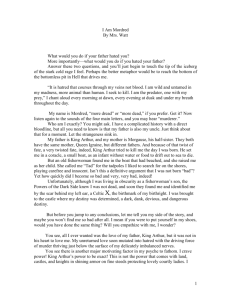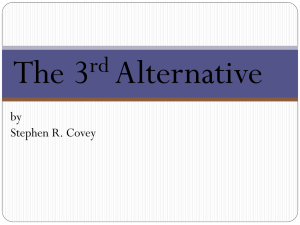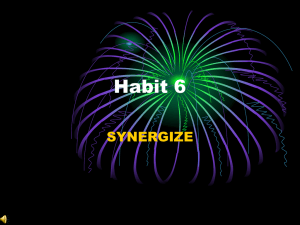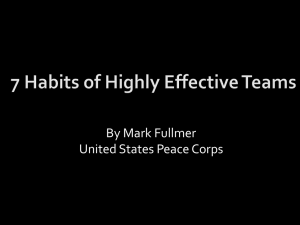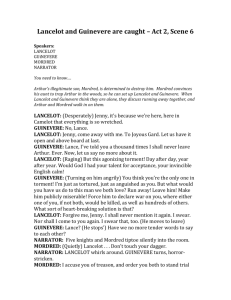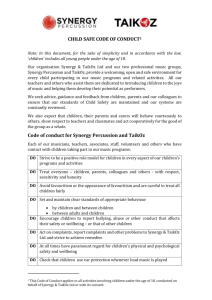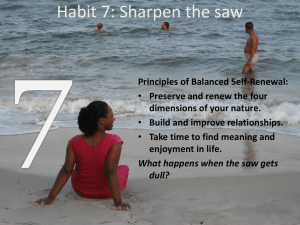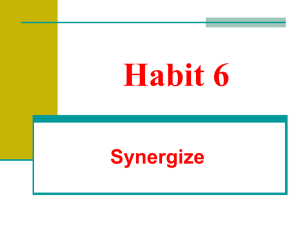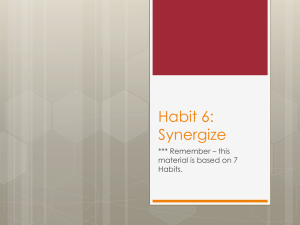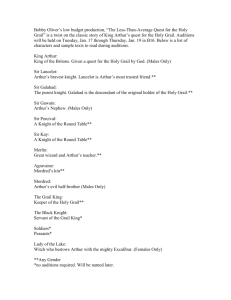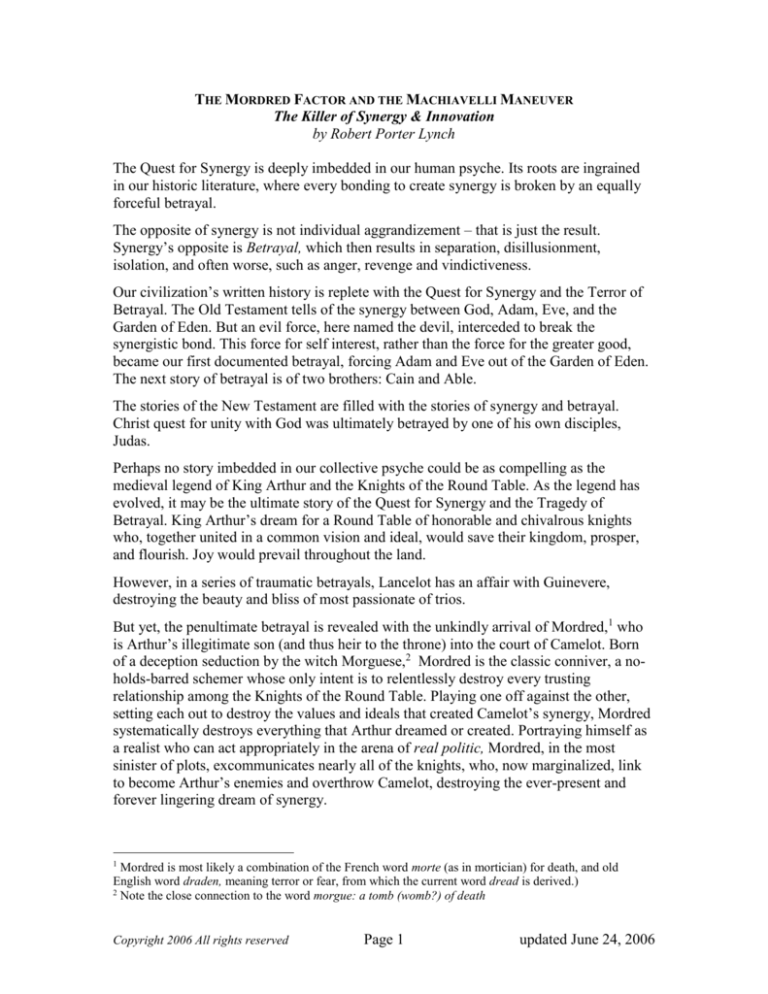
THE MORDRED FACTOR AND THE MACHIAVELLI MANEUVER
The Killer of Synergy & Innovation
by Robert Porter Lynch
The Quest for Synergy is deeply imbedded in our human psyche. Its roots are ingrained
in our historic literature, where every bonding to create synergy is broken by an equally
forceful betrayal.
The opposite of synergy is not individual aggrandizement – that is just the result.
Synergy’s opposite is Betrayal, which then results in separation, disillusionment,
isolation, and often worse, such as anger, revenge and vindictiveness.
Our civilization’s written history is replete with the Quest for Synergy and the Terror of
Betrayal. The Old Testament tells of the synergy between God, Adam, Eve, and the
Garden of Eden. But an evil force, here named the devil, interceded to break the
synergistic bond. This force for self interest, rather than the force for the greater good,
became our first documented betrayal, forcing Adam and Eve out of the Garden of Eden.
The next story of betrayal is of two brothers: Cain and Able.
The stories of the New Testament are filled with the stories of synergy and betrayal.
Christ quest for unity with God was ultimately betrayed by one of his own disciples,
Judas.
Perhaps no story imbedded in our collective psyche could be as compelling as the
medieval legend of King Arthur and the Knights of the Round Table. As the legend has
evolved, it may be the ultimate story of the Quest for Synergy and the Tragedy of
Betrayal. King Arthur’s dream for a Round Table of honorable and chivalrous knights
who, together united in a common vision and ideal, would save their kingdom, prosper,
and flourish. Joy would prevail throughout the land.
However, in a series of traumatic betrayals, Lancelot has an affair with Guinevere,
destroying the beauty and bliss of most passionate of trios.
But yet, the penultimate betrayal is revealed with the unkindly arrival of Mordred,1 who
is Arthur’s illegitimate son (and thus heir to the throne) into the court of Camelot. Born
of a deception seduction by the witch Morguese,2 Mordred is the classic conniver, a noholds-barred schemer whose only intent is to relentlessly destroy every trusting
relationship among the Knights of the Round Table. Playing one off against the other,
setting each out to destroy the values and ideals that created Camelot’s synergy, Mordred
systematically destroys everything that Arthur dreamed or created. Portraying himself as
a realist who can act appropriately in the arena of real politic, Mordred, in the most
sinister of plots, excommunicates nearly all of the knights, who, now marginalized, link
to become Arthur’s enemies and overthrow Camelot, destroying the ever-present and
forever lingering dream of synergy.
1
Mordred is most likely a combination of the French word morte (as in mortician) for death, and old
English word draden, meaning terror or fear, from which the current word dread is derived.)
2
Note the close connection to the word morgue: a tomb (womb?) of death
Copyright 2006 All rights reserved
Page 1
updated June 24, 2006
Despite Arthur’s passionate but unrequited hope that Mordred might have a spark of
goodness in him, Mordred persists on his destructive path. Lancelot’s offer to thrust an
iron spike through Mordred’s heart is rejected by Arthur, for whom hope for man’s
salvation reigns eternal. Arthur remains the dreamer, the idealist, and the failure, for there
is neither hope nor salvation for Mordred – only death or isolated incarceration (like
Napoleon’s exile to St. Helen’s island) is the only workable fate. Like the allegory of the
frog carrying the scorpion across the river, then being stung to death by the
unappreciative passenger who says to the dying frog “it’s in my nature,” there is no
alternative to dealing with a Mordred than to cut him out like a cancerous tumor.
Mordred is the embodiment of the sinister. His evil essences is destructive, not through
direct aggression and attack, but by undermining, by indirection, by manipulative abuse
to cause others to do his wicked bidding, by guise and guile.
It is Mordred’s characterization as a person whose values are the archetypical antithesis
to the Arthurian Quest for Synergy that we term the Mordred Factor. Not only do these
people have neither the desire nor ability to collaborate, synergize, and synchronize, but
go to the opposite extreme, and purposefully (either intentionally or unintentionally)
destroy synergy, teamwork, co-creativity, and spiritual community. When done
unintentionally, it usually takes a variety of forms, such as selfishness or insecurity, and
manifests as: blame, criticism, attack, negativity, complain, or fault finding.
When done intentionally, the result is usually far more insidious, destructive, and often
horrifying. To reveal the nature of the intentional Mordred, a particularly unique
characterization emerged during the Renaissance.
As a prelude and warning to the emerging Renaissance, Niccolo Machiavelli3 wrote his
classic tale: The Prince as a handbook for power and control. Machiavelli, a student of
real politic, details the use of initiating manipulative techniques to offset, counter-balance,
overthrow, or combat others engaged in Mordred like activities. The age of intrigue was
formalized, making betrayal, conniving, conspiracy, and scheming its own art form.
Machiavelli’s Prince is not strictly evil, he is a fox. And a fox he must be in a world of
Mordreds, where there may be limited options to slay the dragon Mordred. Outfoxing a
kingdom well populated with Mordred’s takes the cunning of a fox.
Shakespeare took Machiavelli to the theatre. Shakespearian tragedy is the personification
of betrayal. Romeo and Juliet, is the story of the Quest for Synergy in the form of love
betrayed by class distinction. In Macbeth and Hamlet the audience is bedazzled by a
string of multiple betrayals that enfolds us in the tragedy of a denied dream of
collaboration, honor and joy. Julius Caesar pits the betrayals by the conniving Cassius
and the murderous Brutus against the vision of patriotism and honor of Mark Antony. As
Cassius observes to Brutus of the evil:
It’s worthwhile to note the important distinction between Mordred and Machiavelli. The former was
insidious, self-centered, and evil; the latter amoral and practical.
3
Copyright 2006 All rights reserved
Page 2
updated June 24, 2006
Why, man, he doth bestride the narrow world ….
Peep[ing] about to find ourselves dishonorable graves.
Men at some time are masters of their fates:
the fault, dear Brutus, is not in our stars, but in ourselves.
(Act I, Sc 2)
Think of him as a serpent’s egg,
which hatch’d, would, as his kind,
grow mischevious, and kill him in the shell….
O Conspiracy,
Sham’st thou to show thy dangerous brow by night,
When evils are most free?....
How many ages hence
shall this … be acted o’er,
in states unborn and accents yet unknown!..
Oh! Pardon me,
thou bleeding piece of earth,
that I am meek and gentle with these butchers!
(Act II, Sc 1)
Then Caesar’s friend, Mark Antony proclaims:
Friends, Romans, countrymen, lend me your ears;
I come to bury Caesar, not to praise him.
The evil that men do lives after them;
The good is oft interred with their bones….
Caesar … was my friend, faithful and just to me.
(Act II, Sc2)
In Henry V, Shakespeare stakes out the vision of synergy:
From this day to the ending of the world,
But we in it shall be remembered:
We few, we happy few, we band of brothers;
For he today that sheds his blood with me
Shall be my brother...
Shakespeare leaves us with an epic struggle with no classic heroes, no optimism for
defeating Mordred or disarming Machiavelli. Consequently, despite the great artistic
vision of the Renaissance, as a practical matter, western society was left with a helpless
archetype for a role model, a modern Hamlet bedeviled by treachery, cunning, and
manipulation, with few tools or strategies to create a sustainable Camelot. Only by
combining iron will with the cunning of the ruler can the forces of Mordred be held back.
As the Age of Enlightenment unfolded in America, the synergy quest became the united
passion of the founding fathers. Blessed with a deep understanding of the fundamentals
of the Greek experiment with democracy and training in reading ancient Greek, coupled
with a strong foundation in Christian theology, a unique group (Jefferson, Madison,
Adams, Franklin, et al) congealed to frame the Declaration of Independence and later the
Constitution. Each document carefully outlines the vision for a synergistic new republic
based upon a rebirth of Plato’s Republic. The system of rights was designed to produce a
win-win relationship between people and their society, while the system of checks and
Copyright 2006 All rights reserved
Page 3
updated June 24, 2006
balances prevented tyrannical abuses from the Mordreds and Machiavellis that
continually prowl and prey upon the idealistic vision of democracy.
The American Revolution produced its Mordred in the personage of Benedict Arnold. In
the fifty year period after the revolution a string of Mordred’s appeared, the most
recognized today being Aaron Burr, or the scandalous theft of the presidential election of
1824 by John Quincy Adams and Henry Clay, along with other scoundrels of equal
magnitude, despite their relative historical obscurity today.4
The Mordred Factor is highly visible in today’s sports arena. Several coaches are notable
in their ability to eliminate the Mordred’s from their teams, thus producing a synergy of
performance excellence. Take the following sports examples:
Basketball: Red Auerbach of the Boston Celtics was a mastermind in building team players
who create mutual value in each other. His teams that had players like Bill Russell, Bob
Cousy, Tommy Heinson, Jim Havlichek, Larry Bird, Robert Parrish, and K.C. Jones had
unparalled strings of championships because of the synergy of teamwork.
Football: Bill Bellichek of the New England Patriots has carried on the Celtic tradition into
football. By contrast, Terrell Owens is a classic Mordred, now having been cast off from the
Philadelphia Eagles for inciting internecine warfare on the team.
Teamwork: Arguably, the two greatest athletes of the twentieth century were Michael Jordan
in basketball and Wayne Gretzsky in hockey, because they not only led their respective sports
in points scored, but also in assists – handoffs to other players who then scored. Watching
these two men play was synergy in motion.
In our world of emerging value networks, alliances, and cross functional teams, it is
essential for every leader to be cautious and observant regarding the potential Mordred on
the team. As one respected leader told me recently:
“I’m leaving my organization to join another. My boss hired a person for our team who has
been so disruptive that now everyone is being played off against the other. I spend all my time
now worrying about who is going to put a knife in my back. I used to be a high flyer. Unless I
leave I’ll have no future.”
Another executive lamented about her subordinates:
“I hired the most qualified people I could afford. But they are always breaking down, working
for their own self interest. There is no teamwork, no synergy, and no synchronicity. We don’t
coordinate well. No amount of team building seems to work.”
Unknowingly, she made the mistake of hiring her team based on competence, not
character,5 resulting in a majority of people being or becoming “Marginal Mordreds.”
4
The amateur historian may look to the actions of James Wilkinson or Jesse Duncan Elliott as epitomes of
more modern Mordreds in the early 1800s.
5
Japanese corporations are more skilled at getting teamwork to prevail. They hire on the basis of character
weighing in at 80% of the person’s value, and competence at 20%. American companies typically base
their decision on just the opposite proportion.
Copyright 2006 All rights reserved
Page 4
updated June 24, 2006
How an organization creates a culture of innovation and collaboration is critical in either
stimulating or repressing the Marginal Mordred and the Machiavelli Maneuver. As I was
editing this piece, the phone rang. It was a senior manager from a large corporation who
lamented:
“There is no real innovation here and little collaboration. We all have a fear of failure because
people are fired if they fail. If we do make a mistake, we are criticized in front of others. So
no one takes any risks. We talk of innovation, but we don’t walk it. No one collaborates
unless someone else is willing to take the risk and responsibility if something doesn’t work
out. When we try to work in alliance with other companies, there’s an attitude that our
products are always better, and theirs are junk. We see only a very limited set of options. If
someone does have something good, our approach is arrogant: ‘We’ll just buy them.’ When
we do, we kill all their innovation.”
This was said by a man of courage and vision who had been struggling for years to rally
his small team against the overwhelming power of an antithetical culture. Yet we cannot
expect those of vision and courage to act forever like fools. Unless new leadership is
brought in, or alternatively, those of courage join forces as a “band of brothers,” each of
the courageous visionaries will be picked off, one-by-one, or be relegated to live a sorry
life of disillusionment and despair.
Leaders play an enormous role in determining attitudes and behavior.
Unknowingly, many leaders unintentionally betray their subordinate’s expectations for
being acknowledged and rewarded for excellent work, innovative thinking, and
willingness to take risks for the greater good of the organization. When these
expectations are unfulfilled, their morale takes a long, low road to disappointment and
despair. The climate of excitement and innovation yields to an attitude of complaint,
blame, and resentment. It is in this swamp of despair the marginal Mordred breeds like a
mosquito.
If the ghost of Mordred and Machiavelli are prolific in your organization, look to the top
where their spirit may reside. And also look within to see if you are trapped in a culture
of intrigue, innuendo, and doubt in which you’ve become one of the principal or
supporting actors.
Like the smoker who gets a momentary nicotine high, leaders who feast on a diet
cynicism, criticism, blame, negativity, and rule by fear may get an emotional power-high,
but in the long run, with each passing day, sustainable energy is drained from the
organization on its slow decline to death. Work then becomes nothing more than a bittersweet travail with neither victory nor valor, honor nor heroics.
Copyright 2006 All rights reserved
Page 5
updated June 24, 2006

